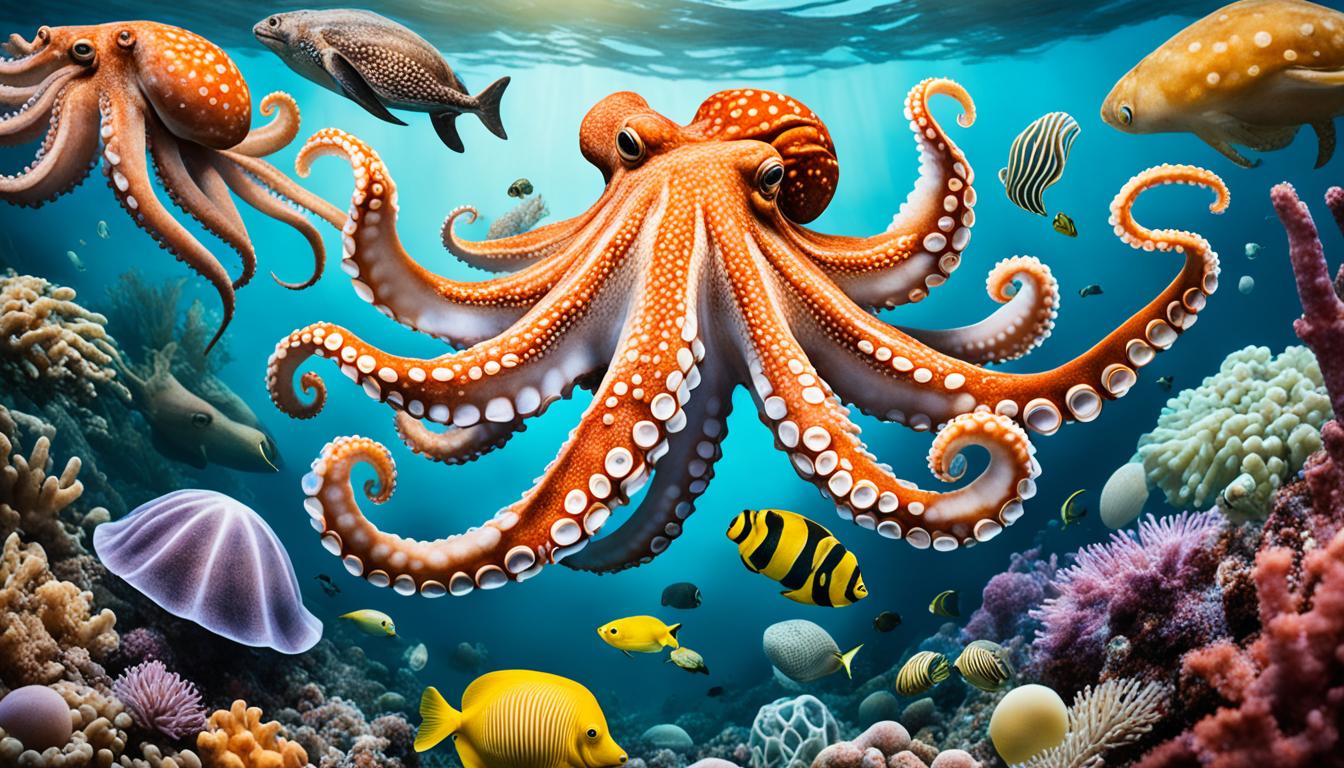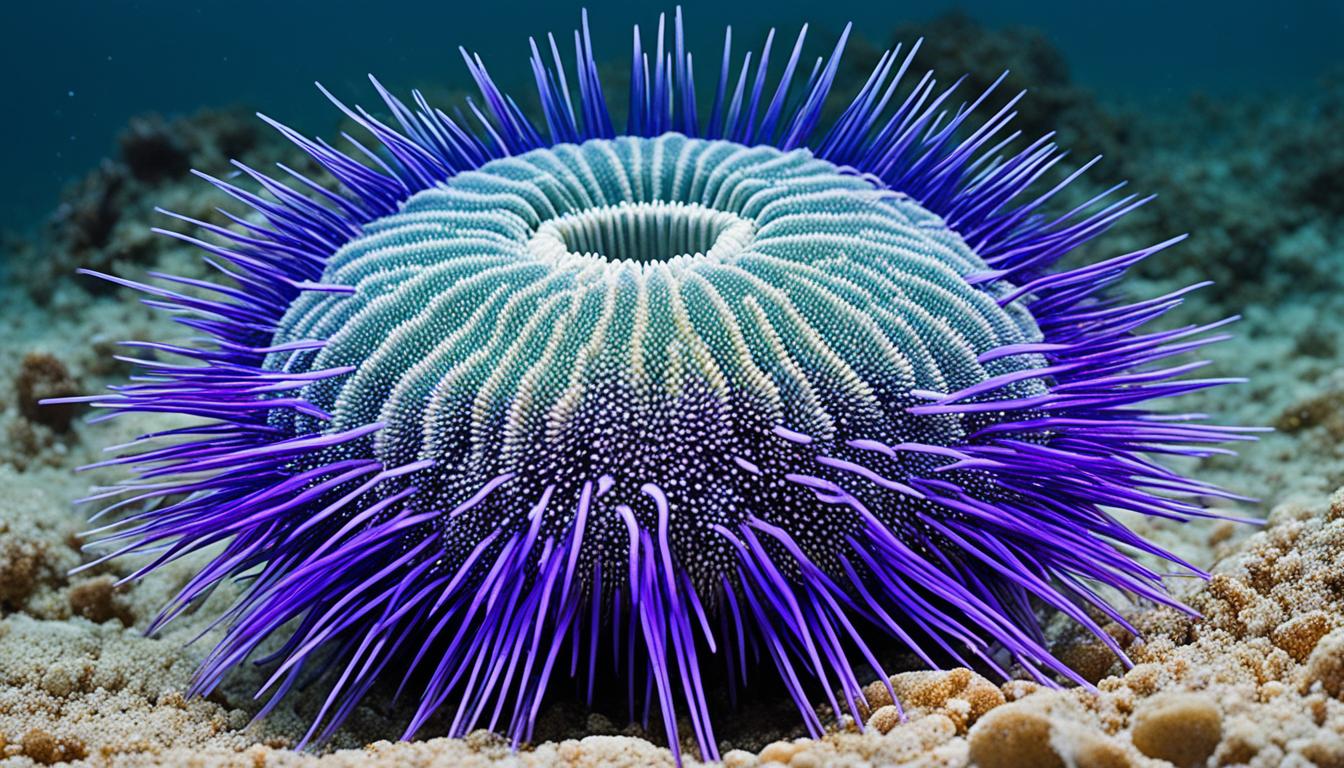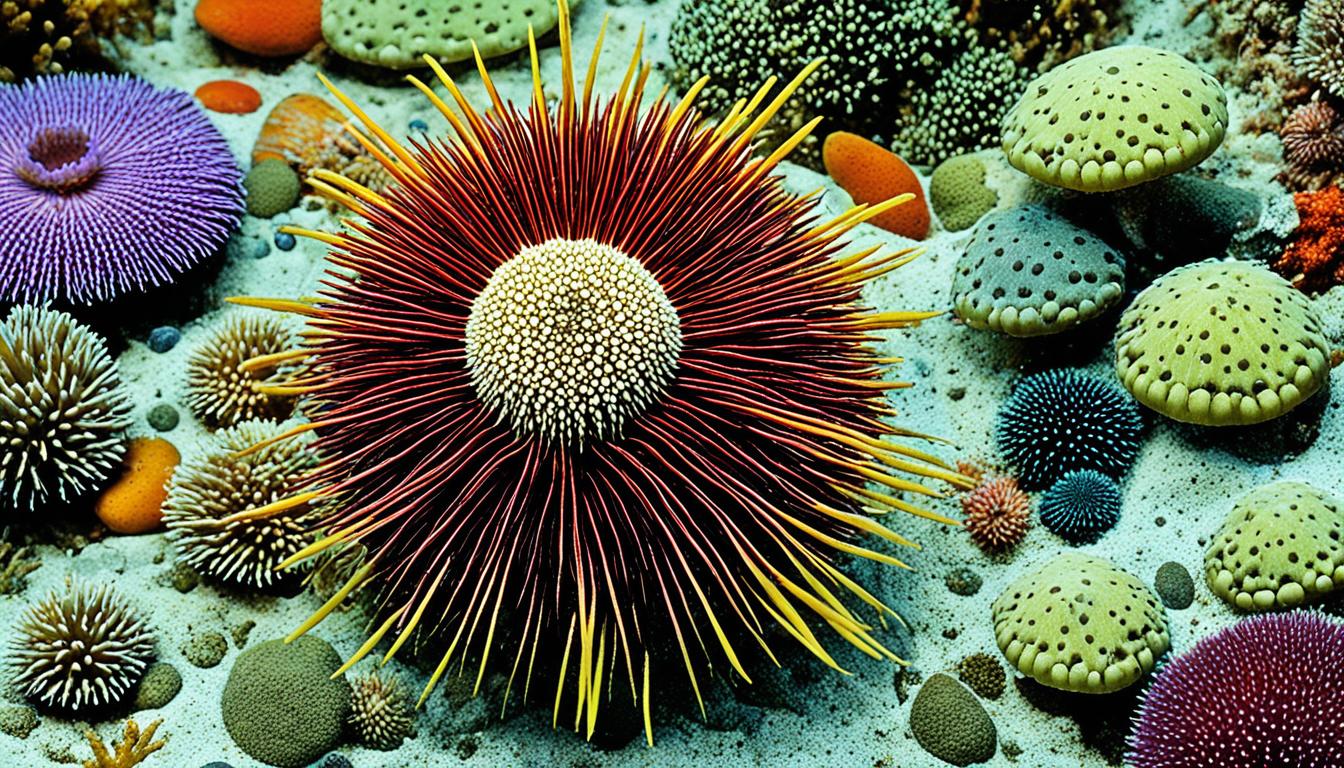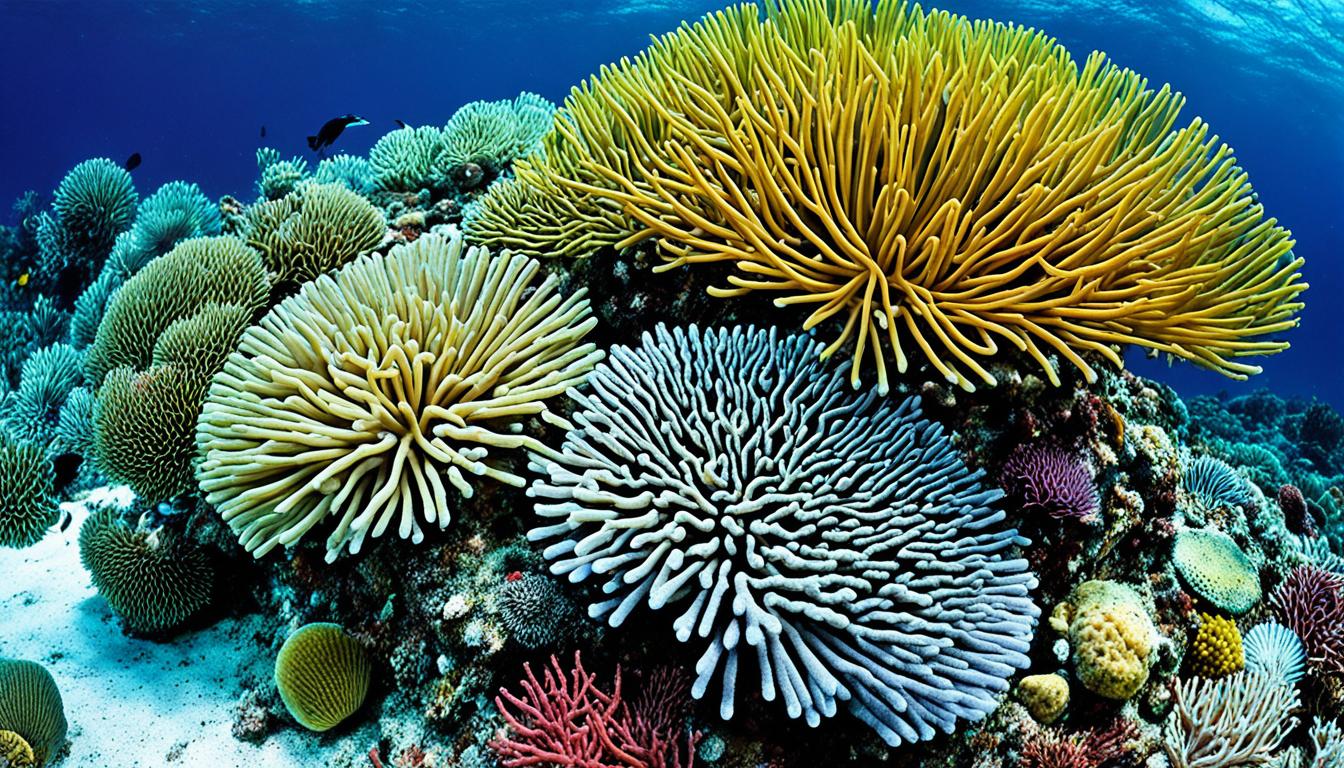Octopuses are fascinating creatures, and their lifespan is quite intriguing. To truly appreciate them, we need to understand how long they live. So, how long do octopuses live? The answer varies a lot, depending on the species and their environment. On average, they live from 6 months to 5 years.
This short life is closely linked to their way of reproducing. In this article, we’ll look into what affects an octopus’s life expectancy. We’ll also discuss how their environment impacts their lives.
The Fascinating World of Octopus Lifespan
Octopuses have always fascinated both marine experts and enthusiasts. They live in various ocean environments, showing off their unique adaptations. With about 300 species, each octopus has its own way of living and lifespan.
It might surprise you how different octopus lifespans can be. For instance, the Common Octopus lives only 12 to 18 months. But, the Giant Pacific Octopus can live up to five years. And some, like the Deep Sea Octopus, can live as long as 18 years.
This variety in lifespans shows how octopuses adapt to their environments and reproduce in different ways. Learning about their lifespans helps us understand their biology and their place in the ocean.
| Species | Typical Lifespan | Notes |
|---|---|---|
| Common Octopus | 12-18 months | Short-lived, adapts quickly to environments. |
| Giant Pacific Octopus | 3-5 years | Known for its intelligence and size. |
| Deep Sea Octopus | Up to 18 years | Exhibits unique adaptations for surviving in deep waters. |
How Long Do Octopuses Live?
Octopuses have different lifespans depending on the species. Knowing how long they live helps us understand their lives and how they survive. This part talks about the lifespan differences and what affects it.
Average Lifespan of Different Species
Octopus species have varying life expectancies. Here’s a table showing the average lifespans for some well-known species:
| Species | Average Lifespan |
|---|---|
| Giant Pacific Octopus | Up to 5 years |
| Blue-Ringed Octopus | About 1.5 years |
| Star-Sucker Pygmy Octopus | Approximately 6 months |
Factors Affecting Lifespan
Many things affect how long octopuses live. Important factors include:
- Environmental conditions: Things like water temperature, depth, and food availability can greatly impact lifespans.
- Reproductive habits: Males often die right after mating, while females may die after laying eggs.
- Predation: The presence of predators in their home greatly affects how long octopuses can survive.
https://www.youtube.com/watch?v=vpKhMLUq_0k
Understanding Octopus Longevity
Exploring the life cycle of an octopus shows us key stages that shape its evolution and survival. The octopus life cycle includes hatchling, paralarvae, subadult, and adulthood. Each stage is vital for their health and how long they live.
Life Cycle of an Octopus
Hatchlings come out of egg sacs and face many dangers. This early challenge shapes their life ahead. They move on to the paralarvae stage, floating in the ocean’s surface. Here, they eat plankton, which helps them grow.
Next, they become subadults and settle on the ocean floor. They hunt, find homes, and adapt to survive. These steps lead many to adulthood, where they can reproduce.
Role of Reproduction in Lifespan
The reproductive habits of octopuses greatly affect their lifespan of octopuses. After mating, both males and females go through senescence, changing physically. Females stop eating and focus on protecting their eggs, greatly shortening their lives. This shows a deep side of octopus longevity.
Hormones from the optic gland start this process, making octopuses unique. Knowing how their life cycle, reproduction, and longevity connect helps us value these smart creatures more.
| Life Cycle Stage | Description | Duration |
|---|---|---|
| Hatchling | Emerges from egg sacs and is vulnerable to predation. | Days to weeks |
| Paralarvae | Drifts in plankton-rich waters for nourishment. | Weeks to months |
| Subadult | Settles on the ocean floor, begins hunting and seeking shelter. | Several months |
| Adult | Fully developed; capable of reproduction and complex behaviors. | 1 to 2 years, species-dependent |
Octopus Lifespan in the Wild
Exploring the octopus lifespan in the wild shows a tough reality. Many young octopuses don’t make it due to predators. Less than 1% of newborns live to be adults. This shows how big the threats are from marine predators and the environment.
Environmental factors greatly affect their survival. Things like climate change change their food and homes. This makes it hard for octopuses to live long.
Survival Rates and Environmental Impact
Octopus survival rates vary a lot. Climate change affects their food and homes. Things like predators, destroying habitats, and pollution make survival hard.
Variances Among Species
Octopus species live different lengths of time. The Northern Giant Pacific Octopus can live up to 5 years in good conditions. But, smaller species often live much shorter lives because of their unique ways of living.
These differences in biology and ecology affect how long octopuses live. This is why their lifespans vary across species.
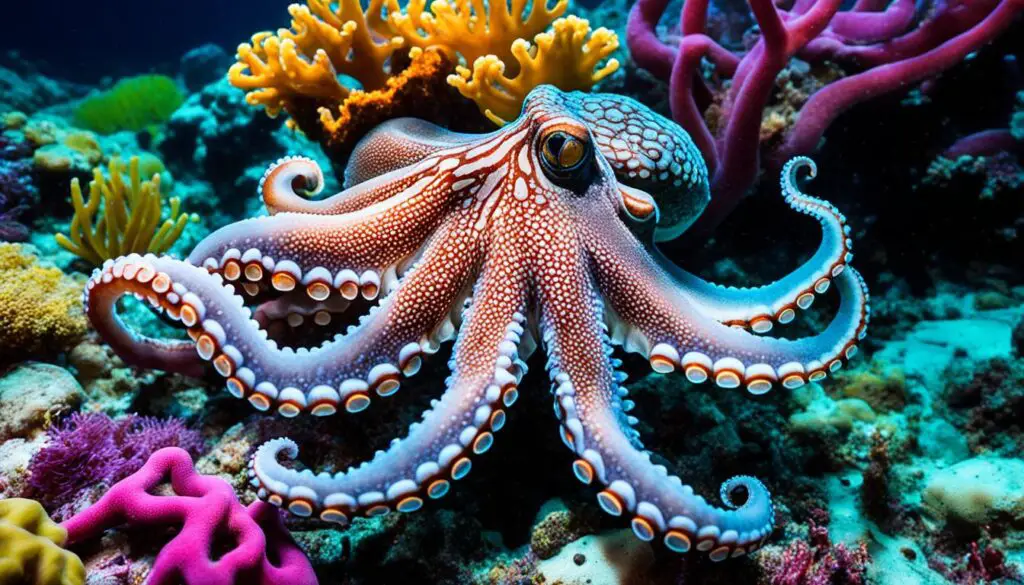
| Octopus Species | Average Lifespan (years) | Predation Factors | Habitat Impact |
|---|---|---|---|
| Northern Giant Pacific Octopus | 3-5 | Large fishes, sharks | Rocky reefs, kelp forests |
| Common Octopus | 1-2 | Predatory fish, larger octopus | Sand beds, coral reefs |
| Blue-Ringed Octopus | 1-2 | Human threats, environmental changes | Shallow reefs, tidal pools |
Octopus Lifespan in Captivity
Looking into the octopus lifespan in captivity shows big differences from their wild lives. Aquariums offer benefits like no predators and steady food. But, many factors affect their lifespans in captivity. Knowing how aquarium conditions impact their longevity is key to their well-being.
Differences Between Wild and Captive Lifespans
Captive octopuses often live longer than those in the wild. Without natural predators and with constant food, they can live longer. In aquariums, watching their health closely can also help them live longer. Yet, they still face challenges that might shorten their lives.
Impact of Aquarium Conditions on Lifespan
The conditions in aquariums greatly affect how long octopuses live in captivity. Important factors include:
- Tank size: Bigger tanks give them more room to swim and explore.
- Water quality: Clean, stable water is key for their health.
- Enrichment activities: Toys and objects keep their minds sharp.
Creating a stimulating environment helps octopuses stay healthy. Poor aquarium conditions can cause stress, which harms their lifespans.
| Species | Average Lifespan (Wild) | Average Lifespan (Captive) |
|---|---|---|
| Common Octopus | 3-5 years | 5-7 years |
| Giant Pacific Octopus | 3-5 years | 5-10 years |
| Blue-ringed Octopus | 1-2 years | 2-4 years |
| Atlantic Pygmy Octopus | 1-2 years | 3-4 years |
This table shows how octopus lifespans differ between wild and captive settings. Better care and the right aquarium conditions make a big difference. This highlights the importance of knowing how to care for them properly.
Reproductive Habits and Their Impact on Lifespan
Octopuses’ reproductive habits are key to their lifespan. Female octopuses usually only spawn once in their lives. After that, they focus on their eggs until they die, showing how their reproduction affects their lifespan.
Male octopuses also die soon after mating. This is called semelparity, a unique way of reproducing. Despite their smartness and complex behaviors, this cycle makes their lives short. So, how they reproduce deeply affects their lifespan.
These habits not only shape their lives but also make us think about their evolution. Octopuses are smart but live short lives. This mix makes us wonder why they reproduce this way, showing the big impact on their lifespan.

